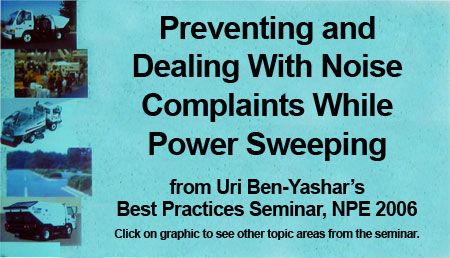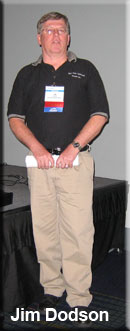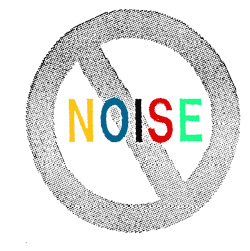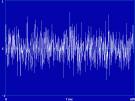Noise Issues in Parking Area Sweeping |
Preventing and Dealing With Noise Complaints While Power Sweeping
This information was provided by the 'noise roundtable group' at the seminar organized by Uri Ben-Yashar at NPE 2006. You'll find the information to be excellent for preventing noise complaints and then handling them when they do surface.Focus Group moderated by Jim Dodson, Mid-State Industrial Service, Eugene, OR.by Ranger Kidwell-RossThe best way to deal with noise issues is to stop them in their tracks before they can get started. It's always best to avoid getting complaints in the beginning. You should also know what, if any, noise ordinances there are in every location where you sweep. 
Keep in mind that if a customer, the police or whoever are getting complaints even though you're within the law, they can typically find some pretense to use in order to shut you down. Sometimes that's changing the law; other times, it's threatening a boycott of the business center, etc. When you do go look at a potential jobsite prior to bidding, take a look around to see if there are any warning signs that noise might be a problem. Are there fences that look like they might 'rebound' sound toward nearby (especially) multi-story housing? Is housing right across the street from the jobsite? If so, sweeper noise may well be a problem. You should also ask the potential client if noise has been a concern at any time in the past. For all you know, that may be the reason the previous contractor is no longer doing the work! While you're at it, inquire about any other aspects of the job that are unusual, or have created problems in the past. Even when you have a route where noise is a concern, there are steps you can take to minimize the problem. One is to be creative in when you sweep that route. You should know the hours of operation for every account you sweep, and often all you'll have to do is to modify the sweeping time at the account and the noise concern will vanish. There are also things you can do in terms of the equipment you use. Unfortunately, making changes in this area can sometimes cost you both time and money. For this reason, we always try to get the most quiet power equipment we can buy to start with, whether those are sweepers or backpack blowers or whatever. 
Air sweepers that have heavy rubber inlet and exhaust tubes are quieter, as are rubber-lined fans and backpack blower units. Many of the sweeper manufacturers these days have a sound reduction package option of some sort or another you can purchase, either when you get your sweeper or as an add-on later. Some offer pickup heads with a noise-suppressant coating of some type on them. There are also aftermarket products, like RhinoLiner-type spray-on coatings, that can be sprayed onto your sweeping head to help reduce noise output from your sweeper. If you have a twin-engine machine, you might experiment with re-routing where the exhaust comes out. Some contractors claim to have had less problems with single-engine sweepers, although others cite a higher-pitched whine that they think is equally annoying. Especially with twin-engine sweepers, operator training can be very important. Teach them that the sweeper doesn't need to be operated wide open most of the time to pick up what's in an average parking lot. An advantage to good operator training is they'll keep the engine at just the RPMs needed to get the job done. Most of the time, a parking lot sweeper can be operated well below their maximum RPM, which reduces both fuel usage and wear-and-tear on the machine. 
There are also blowers available that are quieter, although they come with a somewhat higher initial purchase price. Both sweepers and blowers are available with a noise output at least as low as 65dB these days, whereas there are some out there that are in the area of 95dB. Because the decibel scale is logarhythmic, that difference represents an enormous jump in sound output. Comment made by Uri Ben-Yashar, seminar leader: "In my experience of having both single- and dual-engine machines, where we've had noise complaints I've been able to arrange with the management of the property to go in with a single-engine sweeper and be able to do so without complaint about 70% to 80% of the time. "The rest of the time I've found that it's a political issue. It's the 'We never wanted that Wal-Mart here in the first place, so now that it's in our option is to complain about whatever we can complain about, the dumpsters, the deliveries, the noise of the sweeping, etc.' In those cases, as soon as someone sees the sweeper go in they just get on the phone to complain. In those instances, not much can be done." There are also some other innovative approaches you can use. These include turning off your light bar while sweeping, re-positioning your warning lights to lower on the sweeper (like under the chassis), and hand-picking selective areas of an account. You'll find that a variety of ordinances may be on the books that can be used to affect sweepers. In some instances, contractors have been stopped even when there are no ordinances whatsoever regulating noise; in at least one case, the sweeper was forced to stop sweeping an account simply because a complainant had gotten hold of the mayor's home phone! However, by using the information found in our noise section, you'll at least have the ammunition you need to present the sweeping industry's case for why parking area sweeping needs to be done, by and large, during nighttime hours. Some of this information also covers the many reasons why it is so important to maintain a regularly scheduled sweeping routine on commercial properties. If you need assistance in developing a plan of approach for noise restrictions in your area, feel free to contact the WorldSweeper.com Team for ideas and help in your effort. |
© 2005 - 2012
|
Parking Area Sweeping Contents
|